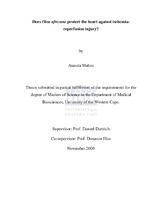| dc.description.abstract | Cardiovascular disease is a major health problem and remains the number one cause of death worldwide. For centuries, medicinal plants have been used in different cultures as medicines for the treatment and control of various diseases. Olea africana, also known as the wild olive, is amongst the herbal plants used by people to treat many ailments.Recently, scientific studies on the hypotensive, vasodilatory and antidysarrhythmic effects of O. africana have been reported. Triterpenoids isolated from the O. africana leaves, for example, have antioxidant properties. The aqueous extract from the leaves of O. africana also have angiotensin-converting enzyme (ACE) inhibitory effects. ACE inhibitors and antioxidants protect the heart against ischemic-reperfusion injury. The serine / threonine protein kinase B (PKB) also known as Akt is activated downstream of
phosphoinositide 3- (PI-3) kinase (PI-3-Kinase) and is involved in cardioprotection
against ischemia-reperfusion injury. Angiotensin II (AII) decreases the intrinsic PI-3-kinase activity. In this study, we hypothesized that ACE inhibitors increase PI-3-kinase activity and thus activates PKB. The aims of this study were: 1) to determine whether treatment with the crude aqueous extract of leaves of O. africana protect the heart against ischemic-reperfusion injury and 2) if so, to determine whether the protection is mediated via the PKB signaling mechanism.
Hearts isolated from male Wistar rats were perfused with different concentrations of the plant extract. In one set of experiments, male Wistar rats were treated with the plant extract (1000 mg/kg/day) for 5 weeks for the evaluation of cardiac function before and after ischemia. At the end of the experiments, hearts were freeze-clamped and kept for PKB / Akt determination. In another set of experiments, we determined the effect of O. africana extract (1000 mg/kg/day) or captopril (50 mg/kg/day) on infarct size. Rats fed jelly served as controls for captopril. In a subset of experiments, hearts were frozen immediately after treatment with O. africana extract (1000 mg/kg/day) or captopril (50mg/kg/day) and PKB were determined.Perfusion with the plant extract significantly decreased coronary flow (p<0.05). The heart function was decreased as evidenced by observed decreases in the force of contraction and heart rate, although these were not measured. Chronic treatment with the crude aqueous plant extract had no effect on cardiac function before ischemia, functional recovery (% left ventricular developed pressure and % rate pressure product) and PKB /Akt phosphorylation (p>0.05). Both the aqueous extract of O. africana leaves and captopril had no effect on infarct size compared to the control group (p>0.05). Captopril,however, improved the recovery of the left ventricular developed pressure. Non-perfused
hearts isolated from rats treated with O. africana extract and captopril did not show any response to both captopril and the O. africana extract treatment as measured by PKB /Akt phosphorylation. The results of the present study suggest that the crude aqueous extract of O. africana is not cardioprotective against ischemia-reperfusion injury in this system of the isolated perfused rat heart. | en_US |

